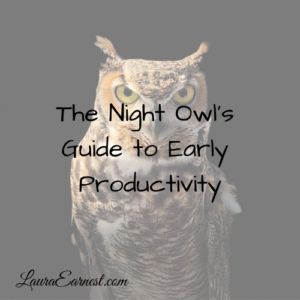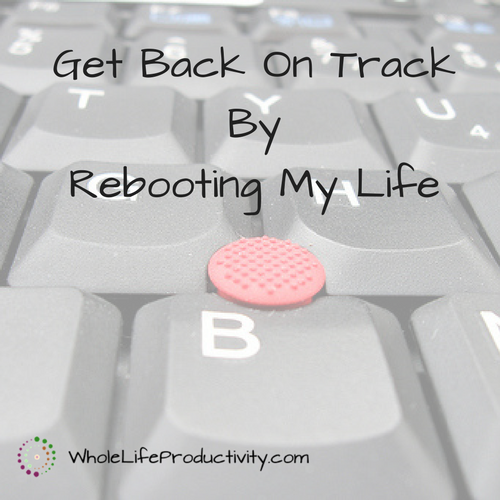
The Night Owl’s Guide to Early Productivity
To people who are night owls either by nature or circumstance, getting up to do a productive morning routine can seem impossible. But it’s possible to claim this quiet and uninterrupted time for yourself.
I am biologically wired to do better at night. I catch a second wind at about 9 pm, and then I am off to the races, mentally alert and ready to flex my creative muscles. If I give in to it, I will work until 1 or 2 am, at which point I force myself to go to bed because I know the consequences rather than because I’m tired.
I don’t allow this to happen often. After all, I am employed outside the home, and I adhere to my employer’s and client’s expectations that I will be in the office during business hours. Taking advantage of that second wind means that I am groggy, cranky and unproductive on the work site.
A good friend of mine is a musician and is forced to be a night owl. He often doesn’t get done with his paying job until 10, and then has to unwind before he can even consider going to bed.
So whether you are a night owl by choice or circumstance, you can still do an early routine.
What “Early” Means
So what does early mean? My friend the musician asked this question, and flat out said he couldn’t manage 5:30. And he’s right. If he’s routinely working until 10, not getting settled until 11, 5:30 is not enough sleep. The end result is you have to decide what early means to you.
For me, early is 5:30 because it allows me to get things done before I have to get ready and head to my job. I can do this because I can adjust my bedtime to make this happen. My musician friend can’t adjust his bedtime to make 5:30 happen. The best he can do is 7 am, and this is fine.
Why Early Is Better Than Late
So why wouldn’t a night owl just find the solitude later in the day? Doing these productive activities right before bed?
If the night owl doesn’t have any place to be in the morning and has complete control of his schedule, this is not a bad thing. Another friend of mine, who works for herself, used to fret about her non-standard schedule. But she sets her own schedule, and as I pointed out to her, as long as she was getting things done, what does it matter what the clock says?
My musician friend wanted to do his creative work – composing – after he got off his paid work. This time was not consistent, though, because sometimes he wants to hang out with friends.
The key lies in consistency. When can you find time consistently where you won’t be interrupted in order to complete these activities? If it’s not consistent, it won’t get done regularly, and that’s kind of the whole point of doing the early productivity thing.
The Benefits of Early Productivity
There are two main benefits to doing early productivity, as I see it. The first is that you can be more consistent with things you do first thing in the morning, particularly if you time them so that you are free from interruptions.
That means that I time my morning routine so that I am done before husband and daughter start asking me for things or asking me if I know where things are. (As a side note, both my husband and daughter are morning people, so having my morning routine has one additional benefit – I don’t have to deal with either’s chipper attitude before the first cup of coffee hits my bloodstream.)
The second advantage is that it provides a good mindset to start the day. Some of my days are packed. When I look at the free time I have to get things done during my day and I see that there is only an hour or two after work, I can get discouraged. But knowing that I have already done important self-sustaining activities can make it seem like the day isn’t a waste.
How To Get There
So how does a night owl manage to get into an early-rising productive routine? Here’s what I’ve found.
Go To Bed
If I’m going to get up early, I need to go to bed early. I really learned this lesson during the year I taught high school. Since I had to leave for work at 6:30, that meant I was getting up at 5:45 (no morning routine survived that time). That means I had to be in bed by 9:45 to get a full 8 hours. I didn’t manage that consistently, but I allowed myself to go to bed as early as I wanted to on Wednesdays in order to keep from building up a sleep debt.
Now, with my morning routine starting at 5:30, I need to be in bed at 9:30. I usually am in bed, but often don’t fall asleep until 10:30 because I have started reading. So I allow myself to go to bed as early as I want to on Thursday nights, since Wednesday I often don’t get home until 9 pm.
Avoid Catching 2nd Wind
This is crucial for me to be able to get up, because it allows me to sleep. I catch a second wind between 10 and 11 pm. The second wind is a huge burst of energy. And while it is a very productive time for me to write, it sets me up for a bad next day.
If I take advantage of that energy, my mind and body revs up and I don’t start settling until about 1 am. If I try to go to bed before that time, I toss and turn as my mind works over creative problems and planning.
If I am in bed before the second wind hits, I can sleep and get up the next day.
For those of you who aren’t sure if you can tell when the second wind is going to hit, I can tell you to pay attention to your mind. Not the tiredness of your body, but the tiredness of your mind. You will start to feel it cycle and pick up energy about 15 minutes before the burst comes. So it is possible to head it off.
(On the days when the second wind is threatening right before I go to bed, I make sure to read something incredibly boring to me – usually one of my husband’s magazines on accounting or from the Naval War College. Sends me right off.)
Walk Alarm Clock Back
Apparently morning people can set their alarms for whatever time, even earlier than usual, and have no problem with getting up. My daughter, to whom I told my strategy of waking up early, looked at me, legitimately puzzled, when I said I couldn’t just set the alarm for 5:30 and be done with it. Instead, setting the alarm back a whole hour just left me to pull the pillow over my head.
Night owls need to make this more gradual. I walked my alarm clock back 10 minutes every 3 days to get it back. Yes, it took almost three weeks, but I was able to make the switch.
Use Light
I find that I truly cannot wake up in the dark. If there is not some source of light, I am going to keep sleeping. I use a sunrise simulator clock. (mine is no longer sold, but this is similar: Philips Wake-Up Light Alarm Clock*). This clock starts about 20 minutes before my alarm goes off and gradually provides the same type of light in the sunrise.
There are other solutions, as well: there is a cheaper version of the clock that doesn’t do sunset simulation*, and you can also use Philips Bulbs* with IFTTT to simulate the sunrise.
Be Warm
Warmth is essential. If I get out of bed and feel chilled, I will head back to bed to get warm. I keep a warm fuzzy robe near the bed, along with fuzzy socks or slippers. My first activity of the day, reading, is done in a chair with a light blanket. By being warm I am able to keep going and resist the bed.
Get Coffee
When I say my first activity of the day is reading, that’s the first activity on the list. My actual first activity is to go downstairs to the kitchen and pour myself a cup of coffee. The coffee is already brewed. I set the pot up the night before and it turns on and brews at 5 am. If I had to wait for the coffee to brew, I would be standing in the kitchen zoning out and wishing I was back in bed. Not a good mindset for productivity.
I don’t accomplish this by a fancy programmable coffee pot, either. I tried one of those and had more issues than coffee. So I use a $25 Mr. Coffee* that has an on/off switch, no programming (the last one I got on sale at Target for $15). I attach it to an appliance timer*. The appliance timer has a built-in battery backup so that I never have to remember to think about reprogramming it should we lose power. I could attach it to a smart outlet, but why mess with what works?
Set A Timer for Activities
I have said before that having a checklist of things to do doesn’t work for me. Mainly because I will glance over the activity. An example of this was my 2016 routine item to read non-fiction. I considered that I had “read” non-fiction if I opened the book and read to the bottom of the page. This got me nowhere, since most of the time I had to scan the page before to figure out what I was reading! Same with journaling. I got to the point where I considered it done if I wrote a single sentence. Not very helpful.
I use timers to help me gauge where I am. I read for 15 minutes; my application limit on my iPad turns off when I hit that limit. I write for 30 minutes; I use my phone timer to keep track. I journal for 10 minutes; again my phone timer manages that.
Using a timer and setting specific times has helped me make significant progress on the things I want to accomplish during the morning.
Know What You’re Going to Do
If I didn’t have a specific set of tasks, but left my morning to be taken over by whatever struck my fancy, it would just be a bit of more free time. If I have a well-thought-out routine of specific things to do, I am more likely to get them done. Let’s face it – morning cognition for night owls is not a common thing. It’s better to have a list and follow it so you don’t have to think.
Don’t Interrupt the Cycle
This is a really important part of the routine. I don’t interrupt having a morning routine, even on weekends. I still do the same tasks upon waking that I do during the work week.
I don’t want to give you the impression that I get up at 5:30 on weekends, though. That seems insane to me. 🙂 But I do set my wake up time to be about two hours before I have to get ready. As I write this article on a Sunday morning, it is 8:41. I got up at 8:00 and have had my cup of coffee and done my 15 minutes of non-fiction reading.
Conclusion
It’s possible for a night owl to have an early morning routine. By adjusting what you mean by “early” and then using specific techniques, even the most seasoned night owl can get the benefits of a productive morning.



